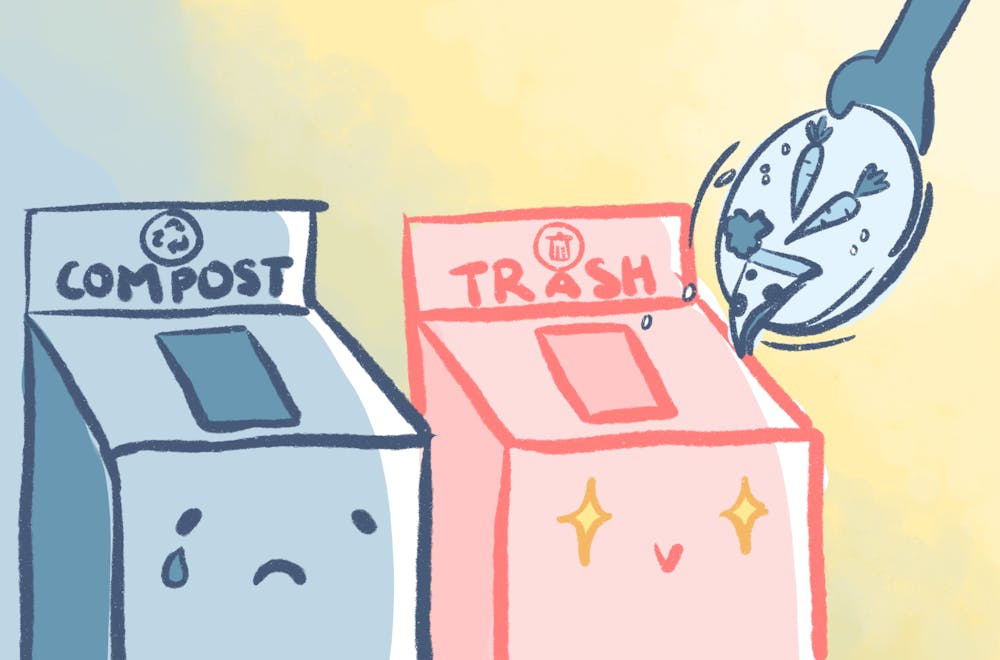The post on compost: The latest of composting at Rice

Heavier than a commercial plane: Rice has composted one million pounds of food waste in total since May 2024 through the Moonshot Compost program. More bins were added due to demand at the beginning of the 2024-25 school year, according to sustainability coordinator Kristianna Bowles.
From the 1990s to the early 2000s, a composting partnership with a device called the Earth Tub was pursued, said Richard Johnson, senior executive director for sustainability in a Rice News article. Using the device was more trouble than it was worth, and this effort was scrapped. However, interest in alternatives continued, and in 2019, a search for a replacement composting system began, Johnson said.
Bowles said that the Office of Sustainability selected Moonshot as a better composting solution.
“We partnered with Moonshot Compost, a Houston-based start-up, and debuted the program in November 2020 at the West Servery,” Bowles wrote in an email to the Thresher. “The program expanded to all serveries and additional collection points across campus, including the Rice Village and Graduate Apartments.”
North Servery has composted the most in total, making up 18.48% of Rice’s total composting efforts, with honorable mentions to 16.75% to Seibel Servery and 16.59% to West Servery. As shown through the Moonshot compost tracker, the serveries are top composting spots. Smaller contributors like Sammy’s and the Rice Graduate and Village Apartments only contribute a few percentage points each to Rice’s efforts. However, these results vary month to month — in a recent Instagram post from Housing and Dining, South Servery claimed the top spot with 12,536 lbs composted in September 2024 — 4,075 lbs more than the runner-up, West Servery.
According to Bowles, the Moonshot operation has been growing steadily over the years of its implementation.
“Due to this consistent scaling of the program, the amount of food waste we’ve been able to save from the landfill has gone up between 10 and 15% each semester,” Bowles wrote.
Isabelle Chang, an intern in the Office of Sustainability, says the office and other student organizations involved in the Moonshot program have plans to expand the composting program.
Chang, a McMurtry College senior, has been the main liaison for the Moonshot program since the end of her freshman year. Chang said one of the initiatives she has planned is redesigning the Moonshot signage to prevent sign fatigue, a psychological phenomenon where people stop paying close attention to signs seen on a daily basis. The signage above composting bins has been the same since the introduction of the program.
Chang said the job does come with some perks — besides exposure to future careers, as she is studying civil environmental engineering and social policy analysis — such as a visit to Moonshot’s headquarters to see behind the scenes on Rice’s contribution to the operation. Two hundred pounds of compost, sorted to remove non-plant matter, is provided to the Rice gardens each year, she said.
“Moonshot is an industrial plant, so they can take a bunch of non-plant matter — but the [Rice] garden only does plant matter. So it’s just interesting to compare those two,” Chang said. “[Moonshot picks] up the compost — and they don’t just do campuses, they also do businesses and residential buildings, and then they have a composting facility out in Conroe.”
After Chang graduates, the cycle of leadership will continue — Will Howley, a Brown College sophomore, is her protegé, she said. The composting program at Rice has changed and grown over the years, and will continue as long as there are technological improvements and cycles of change to be followed — and as long as the cycle of composting can be sustained.
“I’m basically taking him through the things that I do on a regular basis, and I’m obviously still working for them, but just showing him what I do and what my process is, so hopefully this transition will be a little smoother than when I came on — because I basically had to figure everything out,” Chang said.
More from The Rice Thresher

New student center to ‘complete’ central quad
Breezeways, arches and outdoor seating will abound at the Moody Center Complex for Student Life set to break ground May 8. The 75,000-square-foot complex was designed by architecture firm Olson Kundig and has an expected completion date of fall 2027.

Family and faith: The West brothers share values on the field
When Robyn and Greg West enrolled their sons in T-ball, they said they saw baseball as a way to keep the boys out of trouble. Eighteen years later, brothers Graiden and Landon West compete at the Division I level for Rice’s baseball team.

Review: ‘Tamara de Lempicka’ fashions survival at MFAH
Houstonians first knew her as Baroness Kuffner, the mother of prominent socialite Kizette Foxhall, noted for her chainmail dresses and resemblance to Greta Garbo in the Houston Chronicle.

Please note All comments are eligible for publication by The Rice Thresher.